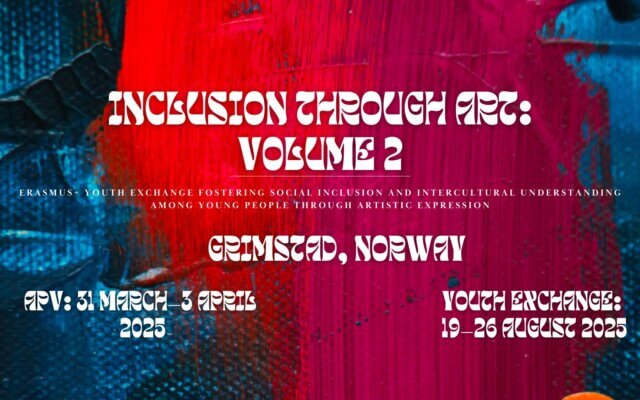ERASMUS+, Klíčová akce 1: tréninkový kurz
Termín konání: 5.—14. březen 2025
Místo konání: Șimon (u Drakulova hradu Bran), Rumunsko
Český tým: 2 účastníci (ve věku 18+ let)
Před tím, než se přihlásíte na jakýkoliv náš projekt, důkladně si přečtěte všechny informace v sekci Chci vyjet na projekt a seznamte se s Pravidly účasti na zahr. projektech.
Pokud máte zájem se na tento projekt přihlásit, prosím důkladně si přečtete info-pack. Pokud máte zájem se na tento projekt přihlásit, prosím odešlete vyplněnou přihlášku co nejdříve.
Pro to, abyste se na tento projekt přihlásili je nutné, abyste vlastnili nejen občanský průkaz (který musíte mít ze zákona), ale také platný cestovní pas (s platností min. ještě 150 dní od datumu začátku vámi vybraného projektu).
V rámci programu ERASMUS+ jsou následující finanční specifika: v rámci všech projektů je kompletně (ze 100%) zajištěno jídlo, ubytování, aktivity, a to vše je zcela pokryto z fondů EU programu ERASMUS+ a zařízeno organizátory. Účastníkům dále budou proplaceny cestovní náklady (reimbursement) z místa bydliště do místa konání projektu a zpět dle způsobu dopravy a to:
- €309 v případě letecké dopravy
- €417 v případě „zelené“ pozemní dopravy (= autobusy, vlaky)
Hostitelská organizace: Asociatia pentru Dezvoltare Activă (ADA)
Popis projektu:
„The Power of Non-Formal Education in Rural Areas – From Rural to Plural“ is a training course designed for entry-level youth workers and other professionals in the field of youth from nongovernmental organizations active in rural areas.
During the mobility, participants will explore and apply the core principles of non-formal education by actively engaging in hands-on workshops, peer-to-peer learning sessions, and interactive simulations. They will understand the power of non-formal education, learn to create engaging learning activities, experiment with different categories of creative methods, and practice managing youth teams and volunteers. They will also gain skills in planning events tailored to rural contexts and discover how these methods connect with the “European Youth Village” program. By the end of the training, participants will feel more confident in bringing dynamic and inclusive youth initiatives to their local communities.
CONTEXT OR THE “WHY”
In many rural areas across Europe, young people face limited opportunities for personal and professional growth. Access to education, employment, and quality services can be scarce, while social and cultural activities are often underfunded or overlooked. This lack of resources and engagement drives many young people to seek better prospects in urban centers, leaving rural communities at risk of stagnation and decline.
Non-formal education has the power to change this dynamic by helping young people develop new skills, express their ideas creatiely, and build confidence to shape their own futures. Through interactive workshops, collaborative projects, and youth-led activities, non-formal education can spark innovation, empower young leaders, and revitalize rural communities.
“From Rural to Plural – The power of non-formal education in rural areas” is designed to equip entry-level youth workers and other professionals with the tools they need to make a positive impact in the rural communities, but not only.
OBJECTIVES OR THE “WHAT”
- Help participants recognize and understand the challenges faced by young people in rural areas.
- Teach practical methods and tools for non-formal education so participants can create engaging learning activities, encourage peer-to-peer learning, and adapt methods to fit local needs.
- Strengthen management and organizational skills by providing guidance on building and guiding teams, coordinating volunteers, and planning events that energize rural communities.
- Showcase innovative and hands-on categories of methods that participants can use to foster active youth involvement.
- Promote collaboration and network-building under the European Youth Village by encouraging participants to exchange ideas, experiences, and good practices.
TRANSVERSAL OBJECTIVES:
- Foster inclusion and diversity by ensuring all participants develop strategies to involve and empower rural youth from varied backgrounds, including those with fewer opportunities or facing additional barriers.
- Strengthen participation in democratic life by equiping participants with the know-how to motivate and guide rural young people toward active involvement in community projects.
- Advance digital competencies and transformation by enhancing participants’ ability to use digital tools, online platforms, and social media effectively, helping rural youth stay connected and informed.
- Promote sustainable and green approaches by encouraging participants to integrate environmental awareness and sustainability into their youth work, contributing to greener youth projects.
- Reinforce European identity, values, and cooperation by building a sense of shared purpose and solidarity among participants from different countries, strengthening ties and collective action across rural Europe.
PARTICIPANTS’ PROFILE OR THE “WHOM”
The training is designed for entry-level youth workers and other professionals in the field of youth from nongovernmental organiza8ons ac8ve in rural areas.
Thus, participants must be youth workers or other professionals in the youth field (including community organizers, project managers, youth leaders, volunteer coordinators or young volunteers who decided to get involved into youth working), aged 18 or above, who wish to strengthen their capacity to work effectively with rural youth through non-formal education methods, creative facilitation, and youth-led events.
They should be motivated to explore how non-formal education can address the challenges faced by young people in rural areas, ready to engage in hands-on learning experiences, and committed to sharing what they learn within their communities. Partoicipants are expected to attend the entire duration of the training course (5th to 14th of March 2025) and be willing to contribute to follow-up activities in their own contexts. They must also have a good command of English, as the training activities will be conducted in English.


